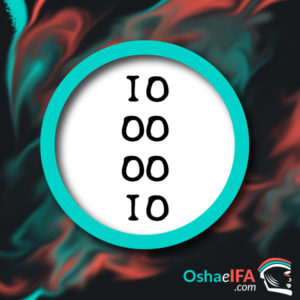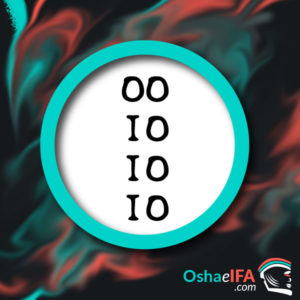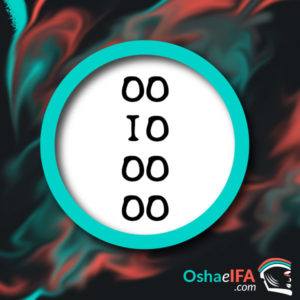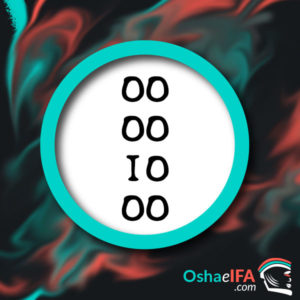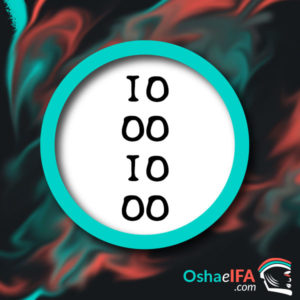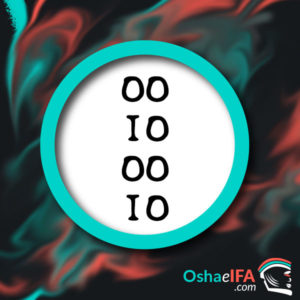Oyekun Bara: Meaning, tips, sayings, patakies and more
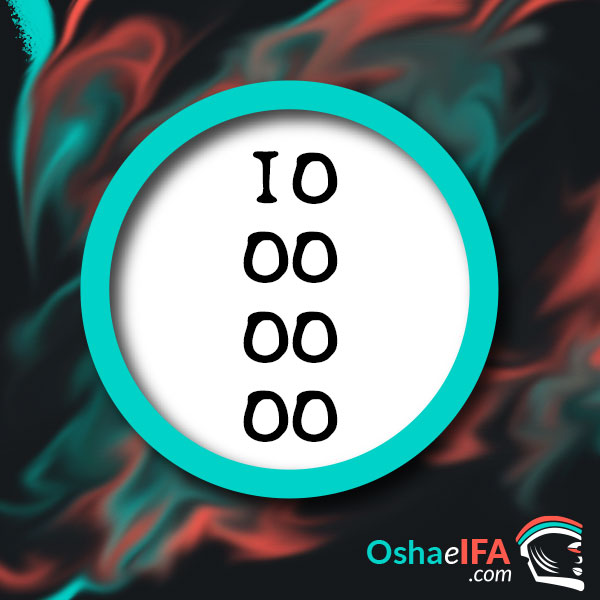
Oyekun Bara is the combination between the main Odu Oyekun and Obara, it is the sign number 37 in the lordly Order of Ifa. This is the sign par excellence in the practice of Moorings and dominions of one person over another. Recommend the worship of the Orisha Shango in order to prosper and be the one who saves us from misfortune.
Ifá wants the person for whom this odu was revealed to be well. They exhort you to make the sacrifice that will keep you from suffering.
Other names of the Odu Oyekun Obara:
- Oyekun Bara.
- Oyekun Palaba.
In the odu Oyekun Bara is born:
- Born: The secret of the mooring.
- Here: A nail is put into Eshu.
- What you want to obtain cannot be with force but with intelligence.
- He is the Odu in charge of bringing the spirit of the deceased Awó out of the darkness.
- Marks debt with Yemajá and Shango.
- He falls asleep with a lamp at the head so that that light veils the journey of his imprisoned spirit.
- The horse and the ox speak.
- Oyekun Bara came down to Earth accompanied by Eshu Mako.
- It was where the man rode the horse.
- Where the dead man was tied for the first time.
Description of the odu Oyekun Bara:
This Odu de Ifá is in charge of making moorings and unmoorings, because this was where Eshu was able to tie the horse. It is also where the dead man was tied for the first time.
Here what you want to obtain cannot be achieved with brute force, but with cunning, intelligence and humility.
This Odu is in charge of bringing the spirit of the deceased Awó out of the darkness.
The Awó of this Odu de Ifá, when he goes to bed each day, should put a lamp at his head, so that that light watches over the journey of his imprisoned spirit during sleep.
For this Ifá (Oyekun Bara) there is a great danger of being tied forever to a son or daughter of Oshún, because their egoism is bad.
The bath (ebó misi) of this Odu is prepared with horse stew (oluyase eshin). Here you know all the secrets from one handsome to another handsome.
For this Ifá, the person has to see the debts that exist with Yemajá and Shango.
For this Ifá, the person has to be careful that a skilled person does not obtain his favors, through his cunning, as this can delay or harm him.
Here the person is interested in another and wants him to return to his side, do not worry that he will return.
When this sign appears in Igbodun, the person must be warned not to send others to perform their functions or make payments of money which is essential for him. She or he can be scammed. Her problems especially with her children were caused by members of her family.
He must not think of revenge, because his difficulties will be overcome and he will overcome his enemies.
You can read: Ifa Obara Yekun sign
Sayings of the sign Oyekun Bara:
- The horse and the ox only their master understands.
- Two people cannot sit in a chair at the same time.
- If he runs away to the rope, he will never be tied up.
- Intelligence is better than brutality.
- A handsome man tames another handsome.
- The horse only understands its master.
Ifa code of ethics of the sign Oyekun Bara:
The Awó achieves his wishes with cunning and skill, never with brute force.Oyekun Bara's Recommendations:
Meaning of the sign of Ifa Oyekun Bara:
Oyekun Bara in divination the person must be warned that he has different enemies creating problems for him, these being his own family. You must have your own Ifá, which will end all your problems and make you triumph over your enemies.
When this Odu comes out, the person will be warned to make sacrifices so that they are not someone else's burden or someone else's guilt and problems.
When this Odu leaves the person must be warned to make sacrifices to avoid any guilt (Injury).
When Oyekun Bara leaves, the person is warned to serve Ifá with a goat because an imminent catastrophe is approaching. It is also said that in the place where the divination is carried out there is a sick, upset, fed up, suffering person who is sentenced to die. In Igbodun he must be told that he should not serve as an intermediary between marital relationships, nor recommend or seek a woman for another. His Ifá forbids him to do so.
In an ordinary divination a goat must be offered to Eshu without delay, to ward off the danger of attacks from robbers (Thieves, attackers).
You can read: Treaty of the Odu Oyekun Meyi
What is the Oyekun Bara sign talking about?
- The Awó of this Ifá must be careful with Brujo's garments, and if he possesses them, not obsess or work with them so that they do not harm him in his life. His defense for his enemies is to receive Osanyin, who is the one who will save him.
- Here the person does not have tranquility due to the influence of the dark dead, commanded by paleros or sorcerers.
- For this Ifá, the person will have stages of poverty and wealth, and will always have to support Shango so that his luck does not go away. His defense for the enemies will be with Osanyin and he will have to receive and attend a lot to Eshu Kako, since this was the Eshu who accompanied Oyekun Bara to Earth.
- For this Ifá, the person has to take care of his marriage and take good care of his children.
- He must be careful with women who are daughters of Obatalá, not mistreat them so that they do not curse him.
- Here the person has an enemy, be careful with taking revenge, it is not going to make you lose and you can even go to prison.
- You must have a lot of intelligence.
- For this Ifá, both the man and the woman have no seat in marriage. Make Ebo to get it.
- Here women are curious, talkative, that is why you cannot trust them with your secrets because, without meaning to, they will give you away.
- This Odu (Oyekun Bara) of Ifá should be put in the athena to make parallo, because it will help to tie the dead easier.
- Here you have to be careful, they are not preparing a trap to enslave you or that someone wants to make a living from their work.
Herbs (Ewe) of Oyekun Bara:
Bomba Fruit, Marilla Macaw, White Aguinaldo.
Says Ifa odu Oyekun Bara
That you are always running or in a hurry. He had a son with his first wife, who left her and that is why he is late. When you see her, give her money and ask her forgiveness. Obatalá, Shangó Yemajá are angry with you because you owe them something. Do not share your secrets with your wife, because she is very curious; nor his friends either. Obatalá has given you three lots, you have been given to another person, and that is the cause for which you are having jobs.
On the way luck comes to you. He loves his wife very much, but if he does not give her character, he will continue to be bad because of her. -If the woman is looking at her, she is told that her husband is going to raise his hand because she is very foolish. You dreamed of a dead man, look to see what that deceased wants. In front of where you live, there is a forest or solar; There is an old Colorado who has money. And why have you stolen from him? Who broke a leg at home? He has wanted to take his life. you are going to have a job and also you have someone who works for you.
Do not raise your hand to your wife and what you know, do not say.-Be careful with a skillful, do not get their favors based on cunning and patience and you. -Put a nail in Eshu.-In the chair, two people cannot sit at the same time.-If you have children with another woman, take care of them. You should not have a cane or an umbrella hanging, put it on the floor. cares about a person; will return to your side even next year. You have to be careful with the tie of women and, mainly, the daughters of Oshún. You can't have drinks around, because they will put witchcraft into your mouth. You have to be careful with Witch clothes and as well as playing with dark dead. -In your house your wife feels or sees something strange, look to see what it is. You want to collect one from your enemy, don't do it, it will hurt him. Be smarter and leave brute force. You must sleep with a light in your headboard. he has to receive Eshu.
Prayer of the Odu Oyekun Bara:
Oyeku Bara Lodafun Oshun Lo Osanyin Oni Shango Shebo Shintilu Asushe Muti Eshin Niloko Shishe
OSHUN LONSHE MAMU OLUFINA OPOLOPO OTI OGU WERE NISHE OMO OLOFIN LODAFUN OSANYIN KEFEREFUN AGBAÑA ONI SHANGO.
Suyere from the Odu Oyekun Obara:
ESHIN KIKO ORE ASERELE ONI SHANGO
WERE WERE NI TI SUN INSHE
Oyekun Bara's Ebbo:
For the tranquility of the son of Shango:
A wooden cup with a drilled base is used to load it with: cotton of the Holy Oils, tiger hair, gold, a piece of Odu-Ara (Lightning Stone), ero, obi, kolá, Osun naború, orogbo, obi motiwao , and is sealed with a stopper made of the same wood as the cup. The cup is washed with SHANGO Herb Omiero and two quail will be given along with Shango and
then it dries.
After drying, an Osun de Shango and the Odu Oyekun Bara are painted inside the glass. Quail hearts and heads are thrown into that painting. When that painting dries, add brandy, red wine, white wine, sweet wine, dry wine, dark sugar, white sugar, Candel sugar, six silver coins to the glass and put it on Shango, asking him to solve all the problems of money, work, tragedy of justice and health of his son Oyekun Bara, and this Odu is prayed.
Afterwards, Ebo is made with a horse, which is the straw doll that the children of the countryside use for their games, simulating a horse. Then they are burned and their ashes, with quail head powder and tiger hair, with the other basic secrets, are taken to prepare the Iyefá of this Odu.
EBO: Ebo is made with horsetail, three snails, soap, parrot feather, street soil, a broken gourd, 21 guinea peppers. With this I know
prepare the soap, pray on the board and use it to bathe.
It may interest you: 15 Love Moorings, Spells, witchcraft, potions to attract and LOVE
Patakie of the sign Oyekun Bara:
The horse and the wild boar.
PRAYER: OYEKUN BARA OLODABA ESHU LO KIMOLO NI OKUNSENI TE ESHIN NEITHER LOKO SESE NI TONSHEMI LAFOSE NIBA AGBA OMO OLOFIN.
EBO: 1 rooster, horse bite, hutía and smoked fish, corojo butter, toasted corn, a lot of money.
Note: The horse's bit is scraped, it is linked with Iyefá de Orúnmila and it is given to take the enemy. Powder is also prepared and blown.
History.
On this path, there was a horse that was teased by a piggy boar. If there was water, it was dirty. It spoiled herbs and all things.
The horse was already tired of enduring so much, that it was decided to go to Orúnmila's house. This, upon registering it, this Ifá saw him and said: -You. wants to take revenge on someone but should not do so, because he can lose his freedom in that
business. The horse left Orúnmila's house dissatisfied, saying: -Instead of giving me something to punish the one who bothers me, he tells me that I am going to do an evil that will harm me. He is crazy!
The horse kept walking, eager for revenge, and thus it met a hunter. He told him his case and the hunter told him: - «I will help you, but for that I need you to let yourself put a brake, the saddle and leave me
ride you ». Blind with anger and a desire for revenge, the horse accepted the hunter's request.
After he allowed himself to be saddled and put on the bridle, the rider had to mount and thus they chased the wild boar that was disturbing the horse and managed to kill him.
The horse was satisfied by the action of revenge and then he asked to remove the saddle and the bridle - he asked for his freedom. But the rider, who was Eshu, understood how useful he was for hunting animals and did not agree to his request, leading him to the stable, where he tied him up.
From that day on, the man rides the horse.
Eshu of the Odu Oyekun Bara
ESHUMAKU:
It is made on one side and is sown in a clay pot or ikokó. Its cargo is: land of crab (ilekan), head of tinea, head of owl, head of guinea, tusk of wild boar, feather of macaw, 21 Guinea peppers, tusk of alligator, 3 eggs of Jew, 1 stone, feather of Parrot, ero, obi, kolá, osun naború, obi motiwao, graveyard land, 21 stick
strong and other ingredients of Eshu's secret.
Eat cock cock.
Oyekun Obara Ifa Traditional
Òyèkú òbàrà.
Òyèkú pàlàbà pàlàbà I pàbó
Awo Orí ló dífá fun Orí
Orí n tìkòlé òrun bò wá ilé ayé
N ti n je nigbàrá òrun òun nìkan soso gíogío
Do you even know how much I read there?
Ti ó bàá òun duó báyìí?
Wón ní kó rbo
Wón ní yóó rìí eni kún un
Orí sì dá duó télè ni
Orí bá rbo
Ngbàa Orí or móo bo
Ojú bá duó tì í
Enú lóun or ba rìn
Imú ní tòun àtiè làwón jó n lo
Etí náà lóun ò níi fi Sílè
Apa, That gbogbo ara ló duó ti Orí
Ifá péléyiún ò níí dá wà lóun nìkan
Ayé Ye Orí.
N ní wá n jó ní wá n yò
Ní n yin àwon Babaláwo
Àwon Babaláwo n yin Ifá
Ó ní béè làwon Babaláwo tòún wí
Òyèkú pàlàbà pàlàbà I pàbó
Awo Orí ló dífá fun Orí
Orí n tìkòlé òrun bò wá ilé ayé
N ti n je nigbàrá òrun òun nìkan soso gíogío
Kèèke
Ojú borí duó
Kèèke
Orùn bórí duó
Kèèke
Etí bórí duó
Kèèke
Enú bórí duó
Kèèke
Imú bórí duó
Kèèke
Orí wá n be ni wówó ire
Wówó ire làá bá ni lésè oba Òrìsà.
In Oyekun Obara: Ifá wants this person to be well. He will not live a lonely life. All his good fortunes come to stay with him. He actually asks for good fortunes and fortunes will come to stay with him.
Òyèkú pàlàbà pàlàbà i pàbó
It is the priest of the Head who made divination for the Head
When the Head came from heaven to earth
He had been defending himself alone in the fields of heaven
It was the head that decided to go to earth
How would I be able to find the company of people?
So the head was alone
They advised him to make the sacrifice
Since he will find accomplices on earth
He then performed the sacrifice
In the time that the Head decided to leave
The eyes supported him
The mouth said that he would go with him
Let's go together, the nose said
I will not part with you, the ear said
Arms, legs, and all parts of the body supported the head
Ifá says that this person will never be a lonely forest guard
Life pleased the head
He danced for joy
He praised his Babaláwo
His Babaláwo praised Ifá
He said it was exactly as his Babaláwo had said
Òyèkú pàlàbà pàlàbà I pàbó
The Head priest who made divination for the Head
When the Head came from heaven to earth
He had once been defending alone in the fields of heaven
Over time
The eyes clung to the head
Over time
Neck attached to head
In time the ears became attached to the head
Over time
The mouth clung to the head
Over time
The nose stuck to the head
The head stays in the midst of abundant fortunes
One finds the fortunes at the feet of the king of the rìsàs.
You can read:



